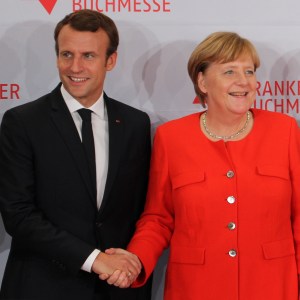 The marriage contract, to be signed on 22 January, is called the Treaty of Aachen. The choice of the site for the nuptials is replete with symbolism.
The marriage contract, to be signed on 22 January, is called the Treaty of Aachen. The choice of the site for the nuptials is replete with symbolism.
Alternatively called Aix-la-Chapelle, Aachen is a sort of Franco-German half-cast, and it’s only 25 miles down the road from Maastricht, where the two countries last reconfirmed their commitment to each other.
Also, Aachen used to be Charlemagne’s capital of the Holy Roman Empire, which was an early marriage between proto-Germany and proto-France.
Since both Manny and, somewhat incongruously, Angie see themselves as present-day reincarnations of the bellicose Frank, it’s only natural that they tie the knot even tighter in Aachen.
The prenup details haven’t yet been fully disclosed, but the general intent is to strengthen the ties between the happy couple. Joint bank accounts are bound to follow, but for the time being the talk is about unifying “the foreign affairs, defence, external and internal security and development”.
Also, the frontier regions on either side of the border will become androgynous ‘eurozones’. One such will doubtless be Alsace-Lorraine, formerly Reichsland Elsaß-Lothringen, formerly Alsace-Lorraine, formerly Reichsland Elsaß-Lothringen.
It’s high time the place were renamed to reflect its denationalised status. I think Reichsland Alsace-Lorraine would do nicely, but I’m open to ideas.
Since the new treaty will to all intents and purposes turn Germany and France into a single state, perhaps finding a name for it is also advisable.
The possibilities are numerous: Frankonia, Frankland, Frankmany, Deutschmand, Deutschfrankreich – I’d hesitate to choose just one, though someone will have to.
The long-anticipated step reflects the genesis of the star-crossed lovers. The EU was originally conceived as a result of a passionate affair between Nazi and Vichy bureaucrats towards the end of the war.
When its outcome was no longer in doubt, Hitler’s and Laval’s chaps sat down and devised a plan for post-war Europe. That got the bandwagon rolling, and directly the war ended those like Adenauer and de Gaulle, who were neither Nazis nor collaborators, jumped on.
Coming into play was the collective Stockholm syndrome afflicting the French since 1871 and the Germans since 1945.
Essentially, the Germans no longer wanted to be German, but the French did. So they consummated their affair at some imaginary mid-point.
Once the EU gestated to full maturity, it remained de facto a Franco-German affair. The two countries were locked in a passionate embrace, and they managed either to dupe or to bribe 26 others into accepting the role of Franco-German vassals.
Naturally, ugly words like lords, fiefs and vassals were never used, but the ghost of Charlemagne kept wafting in and out of EU meetings, getting both the French and Germans pleasantly high.
They preferred to talk about all those nations being one happy family, but there was no doubt that Germany was the father, France the mother, and the rest were children – usually obedient but at times unruly.
Thus the forthcoming marriage casts Angie as the bridegroom and Manny as the bride, but then such gender-bending is much in vogue. The conjugal bliss is supposed to serve as the model for all to follow, but some children are rapidly growing up.
Nationalist, populist parties are gaining strength – and in some countries, power – all over Europe. For example, Italy, now ruled by such a government, is proving to be a right brat.
In fact, Italy and like-minded Poland are threatening to enter into a marriage of their own, forming their own Montagues to the Franco-German Capulets.
Italy’s anti-EU deputy PM and interior minister, Matteo Salvini, doesn’t mince words. He openly talks about breaking the “Germany-France axis”, which, given the evocative power of ‘axis’, is a meaty choice of words.
Salvini doesn’t want Italy to become the Kasbah that large tracts of France and Germany have already become courtesy of the EU. That makes him naturally opposed to the very notion of an EU – the logic is ironclad.
Yet he doesn’t want to remain a bachelor – he too is looking for a suitable bride. Casting his net wide, Salvini has chosen Poland, whose ruling Law and Justice party shares his dislike of Muslim colonisation (it has gone beyond mere immigration) and therefore of the EU.
By way of betrothal, Salvini has met with his Polish counterparts, and they’ve agreed to end the wintry Franco-German domination, taking the continent into a “European spring”.
This is making my head spin. I thought the whole idea of the EU was unity.
Yet it increasingly seems that just about the only thing uniting the EU members other than the happy Franco-German couple is their opposition to the newlyweds and, by inference, the whole idea of European federalism.
The only aspect of the EU they seem to find acceptable is its money, but that may be in short supply. Having suffered a catastrophic decline in industrial output, Germany is about to go into a recession, with France sharing its lot, as a devoted wife should (“…for richer, for poorer…”).
Both Angie and Manny are teetering at the edge of a political abyss, with populist uprisings about to push them over. Nationalist populism is on the rise everywhere, much to the dismay of EU, British and even US mandarins and other fruits.
They blame all and sundry for the on-going debacle, except the real culprits: themselves. It’s today’s ruling elites that are destroying not just the traditional order but indeed traditional nations by not merely provoking but veritably begging for a populist reaction.
This leaves only three things for me to do: to wish Angie and Manny much happiness, however short-lived; to wonder whose sick mind produced the idea of British EU membership; and to question the sanity, intelligence and integrity of those who think we’ll be better off staying in this obscene contrivance rapidly heading for an explosive, ignominious end.